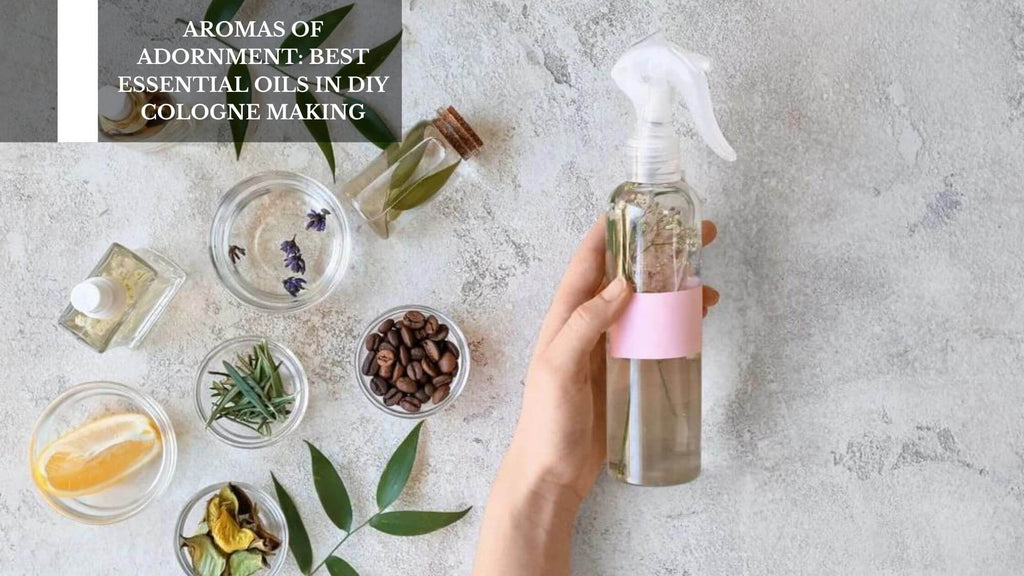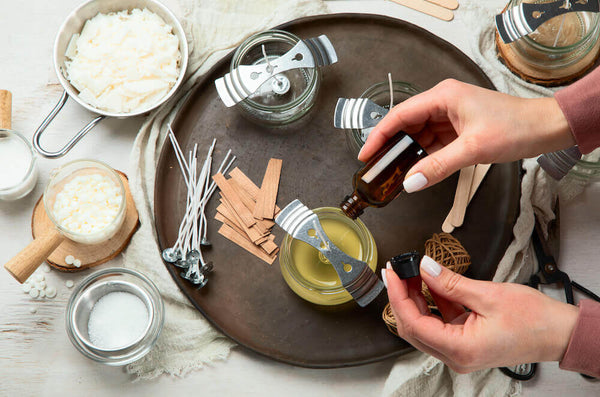Aromas Of Adornment: Best Essential Oils In DIY Cologne Making

A scent is a powerful tool that can enhance your style and evoke emotions. A signature scent is a fragrance that embodies your personality, style, and character. It's a unique blend of essential oils that represents who you are and leaves a lasting impression. Crafting your signature scent has never been easier, thanks to the abundance of essential oils available on the market. In this post, we'll share with you seven must-have essential oils that can help you create a homemade cologne that's uniquely you. Creating your signature scent with essential oils is a delightful and rewarding experience that allows you to craft a fragrance that is uniquely yours. By blending various essential oils, you can create a cologne that not only smells amazing but also reflects your personality and style.
You may also like:
The art of making homemade cologne with essential oils opens up a world of possibilities, where you can experiment with different scents to find the perfect combination that resonates with you. Whether you prefer fresh and citrusy notes, woody and earthy undertones, or floral and exotic aromas, there are endless options to explore. As you experiment with different oil combinations and ratios, remember that creating the perfect cologne is a process of trial and error. Embrace the creative freedom that comes with blending essential oils, and don't be afraid to push boundaries and explore new scent combinations. Whether you are drawn to fresh citrus notes, woody undertones, or floral accents, there is a world of possibilities waiting for you to explore. Crafting your cologne allows you to break away from mass-produced scents and express your individuality through a fragrance that is uniquely yours.
Best essential oils for cologne-making
1. Bergamot essential oil
Known for its fresh, citrusy scent, bergamot essential oil adds a bright and uplifting note to colognes. It is often used as a top note in fragrance blends.
2. Lavender essential oil
With its calming and floral aroma, the lavender essential oil is a versatile essential oil that can add depth and complexity to your cologne. It is commonly used as a middle note.
3. Sandalwood essential oil
Rich, warm, and woody, sandalwood essential oil is a classic base note in colognes. It provides a long-lasting and grounding scent that enhances the overall fragrance.
4. Cedarwood essential oil
It has a soothing and earthy aroma that can bring a sense of strength and stability to your cologne. Cedarwood essential oil is often used as a base note to anchor the fragrance.
5. Patchouli essential oil
It has a deep, musky scent that adds a touch of mystery and sensuality to colognes. Patchouli essential oil is commonly used as a base note and can help create a long-lasting fragrance.
6. Vetiver essential oil
It has a smoky, earthy scent that can add complexity and depth to your cologne. Vetiver essential oil is often used as a base note to provide a strong foundation for the fragrance.
7. Citrus essential oil
Citrus essential oils such as lemon, lime, and orange can add a bright and refreshing touch to your cologne. They are often used as top notes to provide a zesty opening to the fragrance.
Benefits of using essential oils in cologne
Using essential oils in homemade cologne offers a myriad of benefits beyond just creating a pleasant fragrance. These natural oils are derived from plant extracts and carry therapeutic properties that can enhance both the scent and the overall experience of wearing cologne. One of the key benefits of using essential oils is their ability to provide a long-lasting and unique scent profile that sets your cologne apart from commercially produced fragrances. Essential Oils offer complex and multifaceted fragrance notes that evolve, creating a dynamic and personalized scent that adapts to the wearer's skin chemistry. Additionally, essential oils are known for their aromatherapeutic properties, which can have a positive impact on mood and well-being.
Certain essential oils have calming, uplifting, or invigorating effects that can enhance the wearer's mood and confidence throughout the day. Furthermore, essential oils are a natural alternative to synthetic fragrances, which may contain potentially harmful chemicals. By using essential oils in homemade cologne, you can create a non-toxic and eco-friendly fragrance option that aligns with a natural and sustainable lifestyle. Overall, the benefits of using essential oils in cologne extend beyond just the olfactory experience, offering a holistic and personalized approach to crafting your signature scent.
Blending techniques for creating a unique scent

Creating your signature scent is an exciting and creative process that allows you to express your unique personality through fragrance. Once you have selected your essential oils, it's time to delve into the art of mixing and blending to create a harmonious and captivating fragrance. One essential blending technique to keep in mind is the concept of top, middle, and base notes. Top notes are the first scents you perceive when you apply the cologne, typically light and refreshing. Middle notes emerge once the top notes evaporate, providing depth and complexity to the fragrance. Base notes are the foundation of the scent, offering longevity and richness. To create a well-balanced fragrance, start by adding a few drops of your chosen top notes, such as citrus or floral oils, followed by middle notes like herbal or spicy oils. Finally, anchor your scent with base notes such as woody or resinous oils. Experiment with different combinations and proportions to find the perfect balance that resonates with your style.
You may also like:
Another blending technique is to create accords, which are harmonious combinations of two or more essential oils that work together to create a distinct aroma. For example, you could blend lavender and bergamot to create a soothing and uplifting accord, or patchouli and vetiver for a rich and earthy blend. Remember to take your time and trust your senses when blending essential oils. Start with small batches and test the scent on your skin to see how it evolves. With patience and creativity, you can craft a one-of-a-kind cologne that truly reflects who you are.
FAQs
1) How to apply essential oils?
One essential safety measure is to always dilute essential oils before applying them to the skin. Direct application of undiluted essential oils can cause skin irritation, burns, or allergic reactions. It is recommended to mix essential oils with a carrier oil, such as jojoba oil or almond oil, before using them on the skin.
2) How to store these essential oils?
Store your homemade cologne in dark glass bottles to protect the essential oils from light exposure, which can cause them to degrade faster. Amber or cobalt blue bottles are ideal for this purpose. Keep your cologne away from direct sunlight and heat sources. Store it in a cool, dark place like a cupboard or drawer to maintain its freshness and aroma.


Leave a comment